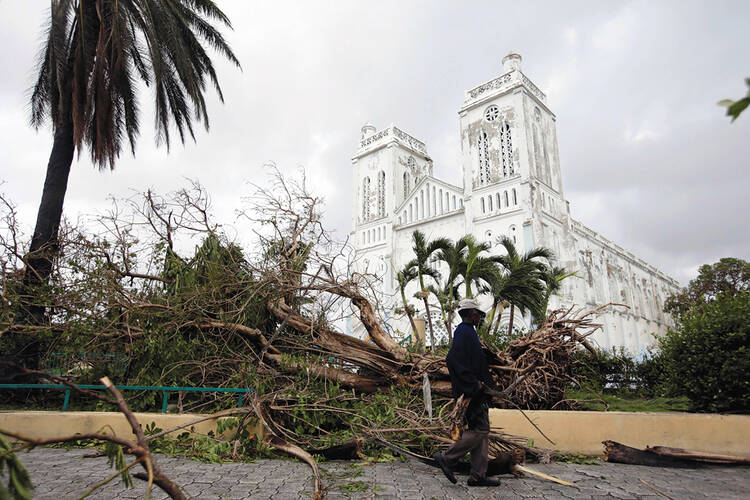Agosta reported that Catholic Charities Miami was still struggling to connect with contacts in Jamaica and was preparing to work with Caritas Internationalis on relief efforts in Cuba. But the office had already received frantic appeals from Haiti for immediate food aid. Matthew had left Haitians bereft of everything.
While Jamaica had received a glancing blow from Matthew, Haiti had experienced the full impact of the Category 4 hurricane. Matthew left the southwestern part of Haiti, the poorest nation in the Western Hemisphere, in shambles after slamming into the country’s Caribbean coast on Oct. 4. The cities of Les Cayes, on the southwest coast, and Jérémie, in the northwest, were said to be particularly hard hit by the strongest storm to strike the Caribbean region in a decade.
The death toll in Haiti had exceeded 370 by Oct. 10 and was expected to rise significantly. Saint-Victor Jeune, an official with the Civil Protection Agency working in the mountains on the outskirts of Jérémie, told the Associated Press that his team found 82 bodies that had not been recorded by authorities in the capital because of spotty communications. Most appeared to have died from falling debris caused by the winds that tore through the area at 145 m.p.h.
“We don’t have any contact with Port-au-Prince yet and there are places we still haven’t reached,” Jeune said, as he and a team of Civil Protection agents in orange vests combed through the area.
Catholic Relief Services officials reported on Oct. 7 that the full extent of the catastrophe on Haiti was not yet known because of hazardous conditions and a breakdown of communications. The news that was emerging was not good.
A field report filed by with the Catholic Medical Mission Board described widespread devastation, including “the most significant single piece of damage affecting the response of C.M.M.B. and other relief teams,” the collapse of the bridge at Petit-Goâve along the only main road connecting western Haiti and Port au Prince. “Hopefully, a temporary fix can be effected quickly, but until then, getting supplies to affected areas will be difficult,” the report notes.
Local officials said that food and clean water were urgently needed, noting that crops had been leveled, wells inundated by seawater and some water treatment facilities destroyed. As Haitians mourned their losses, they tried to recover what they could of their meager possessions. Homes throughout Jérémie were piles of rubble, with roofs mangled and fruit stripped from the trees by high winds. Haiti’s government estimates at least 350,000 people need some kind of assistance in what is likely to be the country’s worst humanitarian crisis since the devastating earthquake of January 2010.
Along with local partners, C.R.S. was responding in some of the most affected areas in southern Haiti and anticipated distributing blankets, kitchen and hygiene kits and other emergency supplies, as well as monitoring potential outbreaks of cholera and other diseases. Officials with the Pan American Health Organization warned about a possible surge in cholera cases because of the widespread flooding caused by Matthew. Haiti’s cholera outbreak has killed roughly 10,000 people since 2010, when it was introduced into the country’s biggest river from a U.N. base where Nepalese peacekeepers were deployed.
Agosta implored people who want to help to consider monetary donations only at this time, explaining that donations of clothing or diapers were not necessarily helpful. What relief organizers need most are resources to make bulk food purchases and arrange emergency transport of food aid to Haiti. (To help, visit C.R.S. at crs.org, C.M.M.B. at cmmb.org or Catholic Charities Miami at ccadm.org.)








